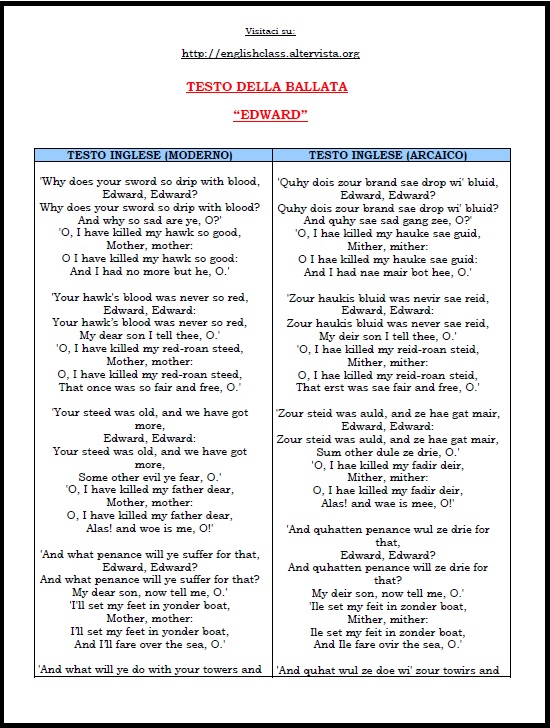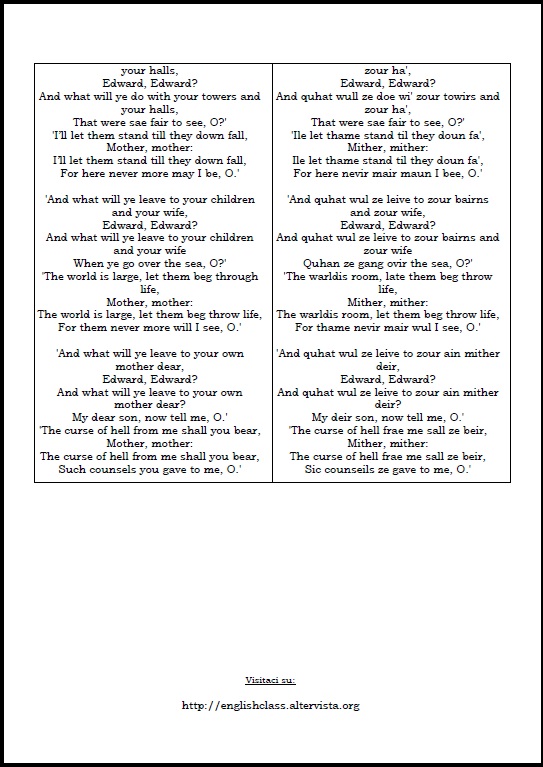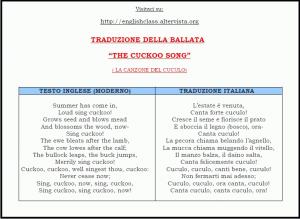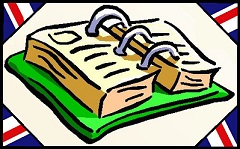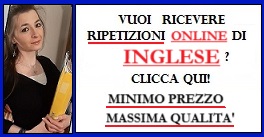BALLATE INGLESI/ ENGLISH BALLADS
SEBBENE ESISTANO MOLTE OPERE PRECEDENTI A QUESTO PERIODO, SI PUO' DIRE CHE LA LETTERATURA INGLESE PROPRIAMENTE DETTA ABBIA ORIGINE NEL MEDIOEVO, A PARTIRE DAL PERIODO ANGLO-NORMANNO, CON IL GENERE DELLE BALLATE.
ALTHOUGH THERE ARE MANY WORKS PRIOR TO THIS PERIOD, WE CAN SAY THAT ACTUAL ENGLISH LITERATURE HAS ITS ORIGINS IN THE MIDDLE AGES, STARTING IN THE ANGLO-NORMAN PERIOD, WITH THE GENRE OF THE BALLADS.
BALLATE INGLESI: INTRODUZIONE /ENGLISH BALLADS: INTRODUCTION
VERSIONE ITALIANA:
Le ballate erano poesie orali, composte in un linguaggio semplice, cosicchè tutti potessero capirle e ricordarle. Le ballate erano famose nel Medio Evo, e questa è la ragione per cui abbiamo molte ballate scritte in quel periodo. Erano chiamate "ballate" perché erano accompagnate da musica e danze ("Ballata" è il termine latino).
Le ballate raccontavano di solito di avventure, di fuorilegge, di amore ed omicidi. La gente pensava che fossero molto interessanti e le apprezzava. La storia era di solito riguardo un cavaliere innamorato di una nobildonna o colpevole di aver ucciso qualcuno. La famosa storia di "Robin Hood" potrebbe essere un esempio di una tipica trama medievale.
Ma non solto la gente comune era solita amarle: le ballate erano molto apprezzate anche dai nobili, che spesso ingaggiavano musicisti e artisti per eseguire alcuni atti delle più famose ballate.
ENGLISH VERSION:
Ballads were oral poems, composed in a simple language so that everyone could understand and remember them. Ballads were famous in the Middle Ages and that’s the reason why we have lots of ballads written during that period. They were called “ballads” because they were accompanied by music and dances (“Ballata” is the latin term).
Ballads were usually about adventures, outlaws, love and murders. People thought they were very interesting and enjoyed them. The story was usually about a knight in love with a noble lady or guilty for having killed someone. The famous story of “Robin Hood” could be an example of a typical medieval plot.
But not only the common people used to like them: ballads were appreciated very much by noblemen as well, who often hired musicians and artists to perform some acts of the most famous ballads.
Le due piu' famose giunte a noi sono:
1) Edward;
2) The cuckoo song (La canzone del cuculo).
BALLATE INGLESI /ENGLISH BALLADS: EDWARD
VERSIONE ITALIANA:
La ballata "Edward" è probabilmente la ballata più interessante dell'inglese antico.
Prima di tutto per il ritmo (dato alla ballata dalle numerose ripetizioni e rime), il quale la fa sembrare quasi una bella vecchia canzone.
Secondo, per la storia raccontata in essa, che è non solo molto particolare nel suo genere, ma anche un ottimo esempio di "spirito medievale".
La ballata racconta la storia di un giovane uomo, il cui nome è Edward, che dopo aver ucciso il suo povero falco, cavallo e padre, va da sua madre per dirle ciò che ha appena fatto.
Edward è probabilmente un cavaliere o un uomo ricco: infatti ha proprietà e case. Il fatto stesso che abbia un falco e un cavallo (molto utili ai signori feudali per cacciare) ci dà un indizio della sua condizione sociale e del suo rango.
La madre di Edward non ha una reazione ai crimini di suo figlio, anzi cerca anche di convincerlo che non sono così terribili e spaventosi. Ma Edward, che si sente colpevole e un assassino, decide di partire, di andare lontano per mare per dimenticare ed espiare. Prima se ne vada, sua madre, che è una donna cattiva ed egoista, gli chiede che cosa ha intenzione di lasciare, per vivere, a sua moglie e ai suoi figli. Lui risponde che non lascerà loro nulla. Allora sua madre gli chiede cosa ha intenzione di lasciare per lei. La risposta di Edward ora è terribile: lui le dà la maledizione dell'inferno, perché lei è quella che gli ha dato questi consigli orribili.
ENGLISH VERSION:
The ballad “Edward” is probably the most interesting ballad of ancient English.
First of all for the rhythm (given the ballad by the numerous repetitions and rhymes), that makes it sound almost like a pretty old song.
Second, for the story told in it, which is not only very peculiar in its kind, but also a very good example of “medieval spirit”.
The ballad tells the story of a young man, whose name’s Edward, that, after killing his poor hawk, horse and father, goes to his own mother to tell her what he has just done.
Edward is probably a knight or a wealthy man: he has estates and houses. The very fact he has a hawk and a horse (very useful to feudal lords for hunting) gives us a clue of his social condition and rank.
Edward’s mother doesn’t have a reaction to her son’s crimes, in fact she also tries to convince him they’re not so terrible and dreadful. But Edward, who feels guilty and a murderer, decides to leave, to go far away by the sea to forget and expiate. Before he goes, his mother, who is a bad and selfish woman, asks him what he’s going to leave –for a living- to his wife and children. He answers he will leave them nothing. Then his mother asks him what he’s going to leave for her. Edward’s answer is now terrible: he gives her the curse of Hell, because she’s the one who gave him
such horrible counsel.
BALLATE INGLESI: LA CANZONE DEL CUCULO/ ENGLISH BALLADS : THE CUCKOO SONG
TESTO IN INGLESE DELLA BALLATA INGLESE "THE CUCKOO SONG"
Summer has come in,
Loud sing cuckoo!
Grows seed and blows mead
And blossoms the wood, now
Sing cuckoo!
The ewe bleats after the lamb,
The cow lowes after the calf;
The bullock leaps, the buck jumps,
Merrily sing cuckoo!
Cuckoo, cuckoo, well singest thou, cuckoo:
Never cease now;
Sing, cuckoo, now, sing, cuckoo,
Sing cuckoo, sing cuckoo, now!
TRADUZIONE IN ITALIANO DELLA BALLATA INGLESE "THE CUCKOO SONG"
L’estate è venuta,
Canta forte cuculo!
Cresce il seme e fiorisce il prato
E sboccia il legno (bosco), ora
Canta cuculo!
La pecora chiama belando l’agnello,
La mucca chiama muggendo il vitello,
Il manzo balza, il daino salta,
Canta felicemente cuculo!
Cuculo, cuculo, canti bene, cuculo!
Non fermarti mai adesso;
Cuculo, cuculo, ora canta, cuculo!
Canta cuculo, canta cuculo, ora!



